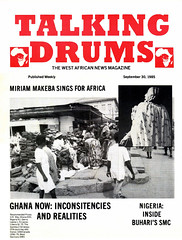Towards Constitutional Government
Economic Recovery Under Unitary Government
Dr. John K. Mumuni Braimah
Dr John K. Mumuni Braimah, of Munich, West Germany, concludes his discussion on why Ghana must have a unitary form of government instead of federalism which has been resurrected in recent times in this debate.With the interplay of Africans' love of kinship and for material success and the ethos of the Extended African Family system, Ghanaian families ran successful cottage industries like cocoa farming, poultry and animal husbandry, grew cotton and wove beautiful cloths and earned money to educate their children. The very fortunate ones in the family had to train to be useful to society and what- ever profession they chose they were morally obliged to return to their parents to serve and work with pride.
Like Northerners on cocoa farms in the Akan area of the country; they always returned to the North, to run their own farms and returned to the cocoa farms in the south, where they worked for money. Others worked in the mines and sent monies home to their brothers and parents. These social arrangements are worth studying and with modifications applied to solve the problem of rural population drift with the attendant rise in unemployment, crime and social diseases amongst youngsters. Our problem today is that Northerners no longer work on cocoa farms, and the sons and daughters of farmers do not stay around either; all roads lead to Accra-Tema because our educational policy makes school- leavers look down on manual work, because our policies in the past, socially and economically, tended to increase the burden of running the country instead of reducing it. We must outlaw polygamy, multi-party system and legislate against large families. The ideal nucleus family should be not more than three.
Let's learn to rely more on precedence, be more flexible on principle and to embrace sincerely policies based on facts. In a trance once, I went out as an illiterate Northern cocoa farmer in The Gold Coast visiting my master's cocoa farm and seeing my groaning old man himself in tattered kente cloth simultaneously trying a hand at farming and cursing, 'Mi di Boni paa," and a shrivelled cocoa tree reiterating, "Gyae woasem!" In tears I ask tersely: "Where dem dey Kokomaketinbord send for Engla make dem go College kam?" We need social and economic progress in Ghana.
We must realise that social and economic progress can come about only if Ghanaians stopped being passive recipients of welfarism and re-cultivate that innate Ghanaian habit of being "our brothers' keeper". To make the rights and responsibilities of citizens real, and to extend them as widely as the conditions of society allow, the African family system, which is an integral part of the organic view of society, and a basis for democracy and at the same time nationalism, must be allowed to flourish.
We must realise that social and economic progress can come about only if Ghanaians stopped being passive recipients of welfarism and re-cultivate that innate Ghanaian habit of being "our brothers' keeper".
Prof. David Kimble (Political History of Ghana, p.185) describes activities of Sir Benjamin Pine, who arrived as governor in 1857, established an elected Corporation for Accra, became a Mayor in 1858 and left behind as part of our history his belief in our efforts that, "the best government is that which teaches people to govern themselves, and certainly the object of this government is not to clean out dirty towns, but to direct the people to that and other objects by controlling and modifying their own government."
In 1946 and 1950 as a schoolboy in the North I witnessed the enstoolment of the chief of Navrongo and Chiana. It was based on the tradition in the area of counting clan-heads, landlords, and basic-rate payers support for each of the princes vying for the skin, and the winner in all three groups got appointed by the representative of the central government in the name of the elders and people of the town.
R.E. Wraith states in his book on Guggisberg that nationalists of those days formulated demands for in- creased opportunities for Africans especially in law, medicine and the public service; for rational economic development; and for a greater share in the process of government, with limited franchise, and for 'self- determination' for West Africa. This together proves that since 1844 electing of choice candidates for representative government has not really been anything strange or new to our people. Non-salaried councillors could be elected to represent various communi- ties of the country. It is much cheaper than any of the suggestions already made in this magazine. Attempts must be made not to drop any either because of the generation gap, religion or political inclination; allowances could be paid out to those attending each time as happened in the past and with the chief as chairman at sessions.
To get citizens once more interested in farming we must permit farmers to keep 5-10% of whatever is produced and exported payable in sterling. Tractors must not be purchased for farmers but kept for hire and used at the appropriate periods of the farming seasons. Northerners must be encour- aged once more to purchase and use bullock drawn ploughs, because families would be forced to raise milk and beef producing cattle as in the past; children of farmers will then not be allowed to run away to the south.
If professionals, especially in the armed forces, can also lead the way as I was done by the police service and broke down ethnic bias then against the army, and police force and established a national character or spirit even before independence, and thereby endear themselves to citizens, Ghana may overcome her problems soon, opanyin and posterity shall smile!
